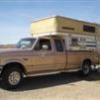
looks like camper battery is done
#1

Posted 22 September 2012 - 04:05 PM
#2

Posted 22 September 2012 - 06:12 PM
~DR
#3

Posted 22 September 2012 - 06:23 PM
If it is in the wheel well, no need for AGM. Just get a lead acid. You won't blow up. Hydrogen dissipates faster than a fart.
~DR
DR its in the front compartment that you step up on to get to the top bunk .
#4

Posted 22 September 2012 - 06:59 PM
I have my two big (Group 31) "wet-cell", aka "flooded" (i.e., potentially H2-venting) batteries in the storage space under the passenger-side couch in my FWC Hawk, next to the front turnbuckle-access port. I keep that turnbuckle access port permanently open about an inch as a vent to the truck-bed/outside. I don't know if even that small amount of venting is necessary, but I see no downside to doing it, so I do.
My camper has never exploded or burned in over 5 years running that way....
...Because, as D.R. said, H2 dissipates much faster than a fart.
BTW: AGM and Gel batteries are also lead-acid...if you want to talk about the other-than-AGM-or-Gel type, call it "flooded" or "wet".
FWC Hawk (2005) on a Ford F250 Supercab, 6.8L V10 gas (2000)
#5

Posted 22 September 2012 - 07:57 PM
Where does that road go?
#6

Posted 22 September 2012 - 10:07 PM
#7

Posted 23 September 2012 - 04:17 AM
Craig K6JGV_________________________ 2004 2500 CTD 4X4 FWC HAWK 1960 CJ5
#8

Posted 23 September 2012 - 04:55 AM
I don't know why that is -- the batteries in my vehicles over the years have had some corrosion on the terminals. I don't know why it's different for the batteries in my camper, but it's a fact -- no corrosion, none of that white stuff, at all.
OK, here's an idea: Could the difference be that the maximum current through the engine battery terminals is much greater than the current drawn from the camper battery?
The corrosion at the terminals is an electrochemical effect, so it makes sense that greater electrical current -- very-much greater when the engine is started, would drive more "chemistry" at the terminals.
That's what I think the difference is.
FWC Hawk (2005) on a Ford F250 Supercab, 6.8L V10 gas (2000)
#9

Posted 23 September 2012 - 02:24 PM
Where does that road go?
#10

Posted 24 September 2012 - 01:03 AM
Craig K6JGV_________________________ 2004 2500 CTD 4X4 FWC HAWK 1960 CJ5
0 user(s) are reading this topic
0 members, 0 guests, 0 anonymous users















